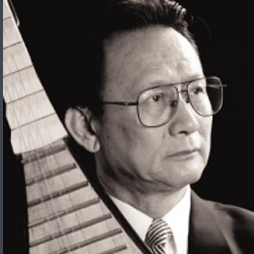Wang Fandi
Organized by 一杯清酒 on 2022-04-06

Wang Fandi, a native of Zhenhai, Zhejiang Province, was born in Shanghai. Famous Pipa artist and educator. He studied under the tutelage of pipa experts Ma Linsheng, Li Tingsong, and silk and bamboo experts Chen Yonglu. Former professor of China Conservatory of Music, president of Beijing Chinese Traditional Music Association, director of China International Cultural Exchange Center.
He has published papers such as "Basic Theory of Pipa Playing Technique and Teaching", "Several Problems of Pipa Right-hand Training", "The Relationship between Pipa's Right-hand Movement Form and Sound Quality", and "Research on Pipa Teaching Language". Some papers have been translated into Japanese by Japanese scholars and published in the Japanese Biwa journal.
In 1991, at the invitation of the Japan International Exchange Fund, he went to Japan to conduct a comparative study of the Chinese pipa and the Japanese Satsuma pipa.
Wang Fandi's teaching and research achievements have a wide range of influences at home and abroad. He has composed and composed "Spring in Tianshan", "Give Me a Rose", "Capriccio of the Red Detachment of Women", "Lancang Spring Dawn" and other pipa solo pieces, and recorded albums and cassette tapes of traditional pipa solo pieces. In 1988, at the invitation of Taiwan Fu Mao Records Publishing House, he recorded "Wang Fandi's Pipa Solo Album". He has in-depth research on various ethnic musical instruments in China. In his rich artistic activities, he integrates performance, teaching and theoretical research. On the basis of inheriting the tradition, he has made contributions to the performance, creation, teaching and research of pipa art.
Similar artist
Li Hui, a young pipa player, is known as "a practitioner on the road of pipa".
read >>
GYang Jin, young pipa player. Master of Arts in pipa Performance, Central Conservatory of Music, is now a pipa teacher at Wuhan Conservatory of Music.uzheng player Yu Qiuxuan - a different woman who dances with the guzheng
read >>
Cao Yang, pipa player of China Radio Chinese Orchestra, director of Pipa Professional Committee of China National Orchestra Society, master of Pipa of Central Conservatory of Music, One Hundred Outstanding Young People of China selected by the Ministry of Foreign Affairs, winner of the "Influential Person" Award of the annual China Hi-Fi Industry Festival.
read >>
LAN Weiwei, born in May 1980, studied at the Affiliated Middle School of Sichuan Conservatory of Music from 1992 to 1998. She has long been the chief of the strumming section of the Youth Chinese Orchestra of the Central Conservatory of Music.
read >>
Yu Yuanchun, female, teacher of the Central Conservatory of Music, the first doctor of pipa from the Central Conservatory of Music, director of the Chinese Ethnic Orchestral Society, pipa player of the National Orchestra of China, UNESCO special artist.
read >>
Involving musical instruments
Pipa (pinyin: pí pa), the first plucked instrument, is a traditional plucked instrument in East Asia, a plucked stringed musical instrument. Made of wood or bamboo, the speaker is half-pear-shaped and has four strings on the top. It was originally made of silk thread, but now it is mostly made of steel wire, steel rope and nylon.
Involved portfolio
Involved news
Organized by 爱在西元 on 2024-12-17
With the gradual drop in temperature, the cold and dry winter is a special test for wooden instruments such as the pipa. In order to ensure that the pipa can still maintain its best condition and sound quality in the cold season, it is essential to take proper maintenance measures. Here are some important suggestions for winter maintenance of pipa.
read >>
Organized by 赵锦辛 on 2024-10-12
On the evening of October 7, the "Unparalleled Chinese Music · Jinse Dragon Walk" Fang Jinlong Qiuci First performance lecture was held in the high terrace residence of Saksak Street, Kuqa City, Xinjiang, bringing a unique musical and cultural feast to the general public and tourists.
read >>
Organized by 拙 on 2024-08-28
Australian pipa teacher Li Xinyang is promoting the charm of this traditional instrument on the local and international stage with his outstanding skills and love for Chinese music culture. Li Xinyang not only teaches pipa playing skills, but also dedicates himself to spreading the beauty of Chinese rhythm, so that more and more people can understand and fall in love with this ancient Oriental art form.
read >>
Organized by 梦昱 on 2024-08-19
On the evening of August 17, Chongqing Youth Plucked Orchestra held a unique pipa night concert in Jiangtan Park on Beibin Road. Several students from Chongqing, Henan, Sichuan and other places joined hands with the teachers on stage to perform a number of classic pipa songs and modern works.
read >>
Organized by CT. on 2024-08-07
Recently, the 5th Liaoyuan Pipa Culture and Art Week and the 5th "Liaoyuan Cup" Pipa Art Elite Exhibition opened in the Southern New Town Grand Theater of Liaoyuan City, Jilin Province.
read >>

 渝公网安备 50010702504639号
渝公网安备 50010702504639号